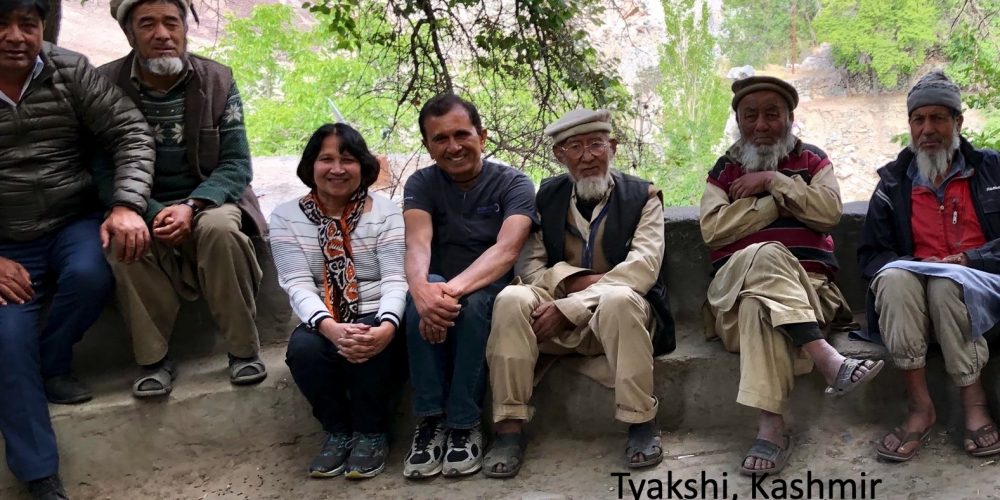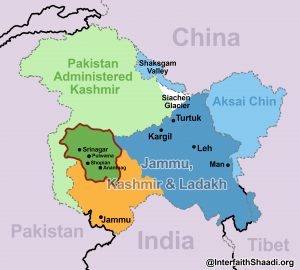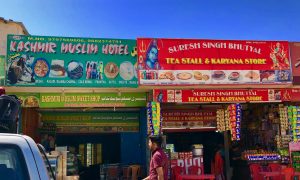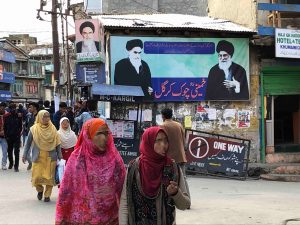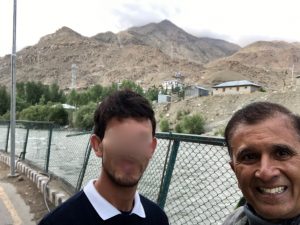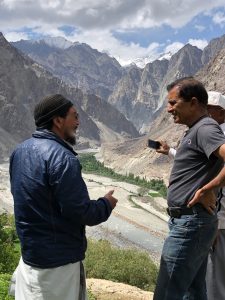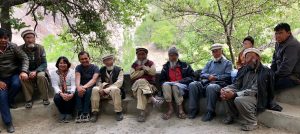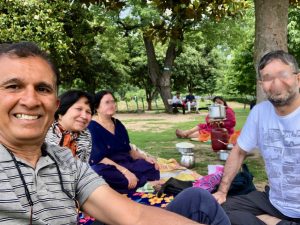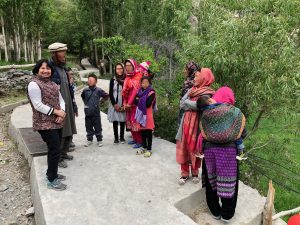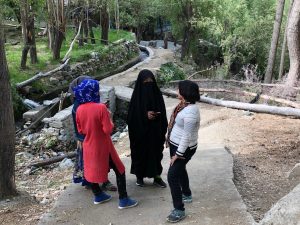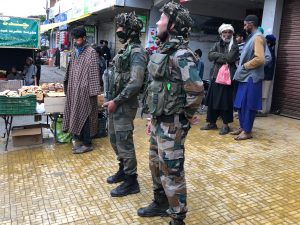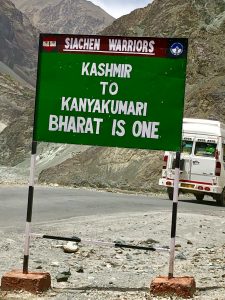It is said that if there is a heaven on earth, it must be in the Kashmir Valley. It is an absolutely beautiful place with warm, loving people. Sadly, these days, tourists are scared to go there. And I was too. But surprisingly, during my recent two week visit; my wife and I felt pretty safe touring Kashmir. Here is an account of my experience, based on interactions with numerous local Kashmiris.
A week before my planned trip to Kashmir, we learned that Zakir Musa, an Al-Qaeda militant and leader in Kashmir, was killed by Indian security forces. Violence had erupted in Kashmir. In spite of that, we took the risk of visiting Srinagar for a day. Within an hour after reaching there, we decided to extend our stay.
We found Kashmiris to be very honest and welcoming. They want tourists to leave the valley with a positive image. When I visited the Shankaracharya Hindu temple in Srinagar, we felt no hesitation in trusting our rickshaw driver with two of our iPhones and an expensive back pack.
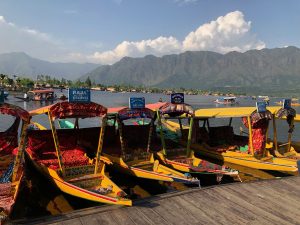
Dal Lake, Srinagar where 90% of Shikaras were still waiting for tourists. Tourist business is very bad in 2019
Locals in the Kashmir Valley appear to be living in peace and harmony. These locals are proud of their land and devotion to their Islamic faith. About 96% of the locals are Muslims and about 90% of these Muslims are Sunnis. I talked to about 25 Muslims, including a 9 year old girl; all of them observed the Ramadan fast called Rosa.
At every major corner, we saw Indian military guards standing with their guns, ready to take-on trouble-makers. The locals of the Kashmir Valley resent this all-pervading military presence.
The people of the Kashmir Valley dream of being an independent nation. They dream of a Kashmir where all like-minded people can live in peace and prosperity. In Srinagar, I was surprised to learn from my taxi driver that they are not hoping to merge with Pakistan- or China-occupied Kashmir but want every inch of Jammu (63% Hindus), Kargil-Ladakh (90% Shia) and Leh-Ladakh (90% Buddhists) as part of their greater Kashmir nation.
Earlier, when I was in Jammu, I discussed this with a Hindu business owner named Mohan (name changed). He laughed off talks of an independent Kashmir nation. He talked about how the Srinagar Government had been harassing the people of Jammu. Jammu is dominated by Muslim majority Kashmiris. He also talked about how most funding was going towards development of the Kashmir Valley. He felt that the development of Jammu and Ladakh was being neglected as a direct result of this preferential funding.
A Shia Kargil-born bank officer told me that Ladakhis do not want to merge with the new Kashmiri nation. Ideally, they want “Union Territory” status. So, Ladakhis are happy to finally get some autonomy from the Kashmir Valley in the form of their recently acquired “Divisional” status.
Rinzen, a Buddhist travel agent in Leh, told me that they didn’t want to merge with the Kashmir Valley because that would heighten the risk of the Pakistani occupation of Leh. The Buddhists of Leh are aware of the genocide of Kashimiri Pandits and are fearful of facing similar religious persecution. They are concerned that they may lose the protection by India by joining the Kashmiris. Rinzen was unequivocal in her message. The Leh people want to stay with India. They want nothing to do with Kashmiris and Pakistan.
Stanzin, a Buddhist Homestay owner from Man-Ladakh, felt that Kashmiris are not good people. So, Ladakhis prefer to be a part of India. He explained that Kashmiris are ungrateful parasites who benefit from India, yet they remain loyal to Pakistan.
Jammu city, Srinagar and Leh are all cities in the same state. My barber was a Hindu man from Jammu city, who considered his options for migration in search of better economic potential. As a Hindu, he knew that he would not survive in Srinagar. His safer option was Leh; where I met him.
Jamyang, a Tibetan Buddhist refugee settled in Leh, told me that the Buddhists of Leh usually marry later and have 1 or 2 children. In contrast to that, the Muslims of Leh sometimes have 2 to 3 wives and 4 to 5 children. This has caused a disproportionate increase in the size of Muslim population. Local Ladakhis love Tibetans because they help maintain their Buddhist culture. Jamyang further added that Buddhist taxi drivers of Leh are scared of going to Srinagar. As far Tibetans are concerned, they prefer to be a part of India. They would rather not deal with Kashmiris at all.
In Jammu, I saw the Indian tiranga flags; with saffron, white and green colours; proudly displayed everywhere. I saw more Indian flags on the streets of Jammu, compared to any other city in India. In the recent 2019 elections, the people of Jammu and Ladakh elected all 3 members of the Indian parliament from the Bhartiya Janata Party (BJP, Modi’s party).
Ali, a young Shia fellow from Kargil, told me that Muslim locals there helped the Indian military against Pakistan during the 1999 Kargil war. Many times he referred to himself by saying “We belong to Hindustan.” Further, he told me that in every procession in his city, they always display the Indian flag. He is proud to be a part of India.
Turtuk is a border town in Ladakh with 100% Muslim population. Turtuk used to be under Pakistani occupation but India got it back during the 1971 war. I talked to about 50 residents of Turtuk from all ages and their consensus was, “Ham to Hindustan ke saath hi khush hai” (We are happy with India).
Watch this video for what Turtuk Muslims have to say
At dinner time, while chatting with a Muslim family, a boy jokingly said, “Hindustan aaya, ameer ho gaye” (India came in 1971 and we became rich), and the whole family laughed. Further, they talked about how the local people helped the Indian military during the 1999 Kargil conflict with Pakistan. One resident said “If Kashmir Valley gains independence, we will stay with India.” Another man said “One time, when Pakistani terrorists came to the town to promote their agenda, the elders handed them over to the Indian police.” This town had 75% voting in the last election and many voted for the BJP.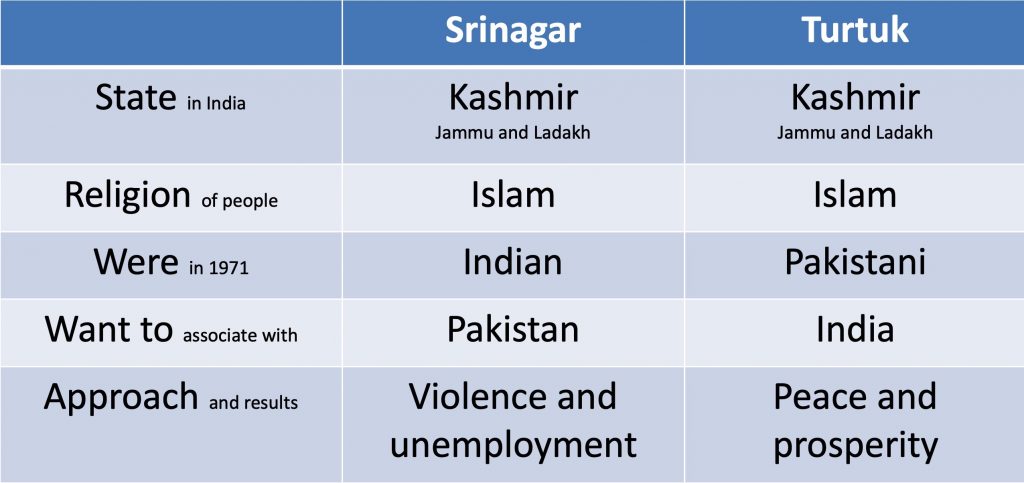
Unlike Kashmir Valley, there was no military patrolling the streets of Ladakh. People here have no issue with India.
Most Jammu and Ladakhi people are satisfied with the current Modi led government and are proud to be a part of India.
In contrast to this, the saffron colour was completely missing in the flags and posters of the Kashmir Valley. The only exception was the tiranga flag within the military compounds, protected by barbed wire fencing. Hindu, Sikh and Buddhist identities were conspicuous by the complete absence of any of their symbols on local signage. The Kashmir Valley has placed restrictions on the building of Hindu and Buddhist temples in the valley. I saw a sign that said “Go India, Go Back” on one of the backstreets of Srinagar.
In the Kashmir Valley, I felt like I was in an Arab or Middle Eastern country. Even though the people looked Indian. Even though their language sounded Indian.
In Srinagar, my rickshaw driver told me that Mr. Modi will make Kashmir a kangal (penniless, destitute) state. He was sure that Modi will launch a major war with Pakistan in the next five years. He was fuming with anger at the possible removal of articles 370 and 35A from the Indian Constitution, which confer a special status on Kashmir. He emphatically warned that, that would be unacceptable to him and his fellow Kashmiris. Similar intense feelings were expressed by other Kashmiris. A taxi driver said to me : “Zakir Musa, who you (Indians) call a terrorist, is Kashmiri’s freedom fighter.”
Kashmiris hate the media for making Kashmir look more violent than it actually is. This continues to severely impact their bottom-line–tourist revenue. This sentiment was expressed by many locals. They request tourists not to trust anything that the media says.
Villages like Shopian, Pulwama and Anantnag are on the border of Pakistan. Often, these villages are hotbeds for militancy. Many educated professionals and college students in Srinagar feel that the people of these villages are responsible for episodes of violence. However, any announcement for a strike after the Friday Mosque prayer causes a total shut down of Srinagar. Stone throwing by youths ensues, apparently not due to those “villagers” but by Srinagar locals. Based on my limited experience, it is not clear whether the separatist notion is limited to a few militants or whether it is shared by the majority in the Srinagar Valley. However, it appears that the moderates have no voice in the Valley or they wish to remain silent supporters of the radicals.
There was a great deal of nuance in people’s views on Kashmir. No two persons had the exact same views on Kashmir. Abdul, a Kashmiri store keeper in Leh, was optimistic about the situation in Kashmir. He said the Indian military continues to help remove militants and control violence. He hopes that Modi will bring more jobs and prosperity to the Kashmiri youth. Abdul said: “Look at India’s map. Kashmir is the head of India. How can we separate the head from its body?” Mahmood’s shop was beside Abdul’s shop. Mahmood was furious about military brutality. He wished that the military be removed immediately and Kashmir be given more autonomy. He does not have a problem being associated with India because it is good for the economy. But he does want more exclusive land rights. Mahmood’s strategy appears to be–yours and mine is ours; but mine (the “Heaven”) is mine to use by others only for tourist revenue. Such is the unfortunate double standard of the Kashmiri Muslims.
Kashmiris feel they are being dominated by Hindu majority India, but they do not realize that in their own state, Sunni majority Kashmir Valley is dominating Jammu (Hindu majority) and Ladakh (Shia and Buddhist majority) people. They choose to ignore, or worse, support, the 1989 ethnic cleansing of Kashmiri Pandit families. Muslims drove out 360,000 Kashmiri Hindu Pandits with an ultimatum for all male Pandits to leave Kashmir and leave behind their wives and daughters (read the book: “Our Moon has Blood Clots” by Rahul Pandita). Kashmiris are not willing to take Pandits back but are glad to incorporate Rohingya refugees from Myanmar; obviously just because they are Muslims.
Regarding Kashmiri Pandits, a local Kashmiri explained the 1989 situation to me in this way. “It was Jagmohan’s idea to take Pandits out of Kashmir and then crush the rest of the Kashmiris.” Basically, he was trying to convince me with incoherent logic that Pandits left Kashmir on their own betraying their fellow Muslims. He added, “As punishment for breaching our trust, Kashmiris will never accept those Pandits back!”
We met a traveling Pandit family in Nishat Bagh who gave his narrative around the 1989 genocide. Mahesh described the incident as the 7th and the last drive to push Pandits to extinction from their home land. Mahesh’s family was forced to give up their 14-room house in Srinagar and walk away with whatever fit in a small purse. Their most trusted Muslim neighbour of long time advised them to simply walk away. Thirty years after the genocide, this Pandit family continues to experience profound fear while passing through their former neighbourhood in Srinagar.
Mahesh also recalled his student life. He was denied admission into reputable colleges, despite securing better grades than his Muslim peers. “Only in Kashmir, you will see such reverse discrimination against minorities. Nowhere else in the world”, he said.
Mahesh noted that in the past 30 years, Kashmiri Muslims have become very prosperous while the Pandits have lost everything including their homeland. Pandits also resent Hindu Indians for not supporting them enough when they were in dire need. Because of the unbearable pain and frustration of their recent past, Mahesh declined my request to video tape his story. He feels that no one cares about the Pandits and it is useless to document it one more time.
I met Geeta in Kargil. She identified herself as a “secular” student from Nagpur. She was clearly aware of the Rohingya situation. However, she had no knowledge of the gross injustice of the ethnic cleansing of the Pandits. Has the new generation of Indians forgotten the injustice to the Pandits?
It appears that the people of Kashmir Valley want to dominate over their minorities and have issues with India. But the people of Jammu and Ladakh have no such issues.
Kashmiri Valley Muslims want their independent nation, but this raises many questions:
- Is this desire for Kashmiri Muslim sovereignty based on Nehruvian documents? Or is it based on the fact Muslims now having achieved majority status, so they feel they can bully all other groups?
- Should India be considerate to Pakistan-sponsored terrorists and their supporters on Indian territories?
- Should India be divided again, based on religion?
- Should other Muslims from India be asked to move to a newly formed Muslim-Kashmir nation?
- If Kashmir becomes an independent nation, what is the guarantee that next, these Kashmiri Muslims will not target the Hindus and Buddhists of Jammu and Ladakh? Will these Hindus and Buddhists suffer the same fate as the Hindu Kashmiri Pandits?
- Will Pakistan give up “Azad” Kashmir and let it merge with the new independent Kashmir nation? Will China give up occupied Ladakh, Aksai Chin?
- Has anyone asked the Hindus in Jammu what their wishes were? Has anyone asked the Shias in Kargil what their wishes were? Has anyone asked the Buddhist of Ladakh what their wishes were?
- Should Kashmir, Jammu and Ladakh be divided as three independent nations? Should people be forced to migrate based on their religions?
- Should China allow Uyghur Muslims to carve out separate nations? Should Russia allow Chechnya to break away as a separate country? Should Pakistan grant separate nation status to Balochistan?
- Is there something wrong with India trying to preserve its integrity?
Muslims drove out or converted all Kashmiri Hindus over the last 700 years, however, today’s Kashmiris certainly love Hindu tourists. Many local Muslims welcomed me and my wife. They invited us into their homes, for tea. Many locals gave us their phone numbers, offering to help us if we got in trouble. One tourist guide book talks about how that the stone pelting at the military was stopped because the locals realized a tourist had been accidentally trapped in their conflict. Kashmiris don’t want to hurt Hindu yatris (pilgrims). People in the hospitality business are upset at the Pulwama bomb blast because it is seriously hurting tourist business in 2019.
Today, Kashmiris clearly hate the Indian government. However, they clearly love Hindu tourists. Tourist revenue comprises about 70% of their total income. Do Kashmiri Muslims truly care about “Hindu” tourists or do they only care about tourist revenue?
Talking about the Pulwama bomb blast, several Kashmiris had similar takes on it. According to them, it was all fabricated by the Kashmir State and Indian Governments for political gain. One local wondered how a truck load of explosives was moved from Pakistan to India in the presence of strong border patrol. According to one local, the government has not released any proof about the identity of the culprit. I sensed that Kashmiris have no issue with Pakistan. Their only issue is with the Kashmiri State and Indian governments.
Locals don’t trust their local elected Kashmiri State Government. I asked them: “It’s a democracy. So why don’t you elect the right type of leaders for you?” Their answer was “We do not vote.” Only 14% of the people of Srinagar voted in the last election. I asked them “Why?” They had no interest in continuing further discussions.
An active duty Indian military Jawan was curious and asked me a question, “How do these locals treat you?” Enthusiastically, I replied, “They love us. Kashmiris are good hosts.” The Jawan replied to me, “Lucky for you. They hate us (the military). They call us filthy names. Any time a brick may fall on our head. I am just doing my duty.” After that, he paused and without looking at me he continued in a soft tone, “I also have a wife and children at home.” I realized that I am enjoying this heaven at the expense of these military troops. I realized the extent of their sacrifice. Tears welled up in my eyes.
Should Indian tourists stop coming to Kashmir to punish the Kashmiris? Personally, I don’t think that way. Kashmir is a part of India, our own nation and Indians should help out their fellow countrymen. The fear of losing tourist revenue is putting the brakes on Kashmiri militancy. Unemployed youths and poor citizens are certainly a recipe for disaster.
I shared my good experiences in Srinagar with John, a student from San Francisco USA, who cancelled his flight to Srinagar. Instead, he went to Leh. Based on what he had read in the media, it was too risky for him to travel to Srinagar. Actually, John was right. Five days before we arrived in Srinagar and two days after we left Srinagar, there were incidents of violence. As per one report, 413 people were killed in 2018 due to violence in Kashmir. We had been lucky during our short window of stay in the Kashmir Valley. Tourists who don’t believe in taking chances should, like John, fly straight to Leh.
Kashmir Valley is certainly God given heaven, but unfortunately everyone is suffering: the majority Kashmiri Sunnis; the minority Shias, Hindus and Buddhists; the military personnel and; Indian and Pakistani taxpaying citizens who are paying for this expensive cold war. The issues appear endless and I do not see an easy solution. Unfortunately, it appears that the status quo is the only near-term solution.
Nature will take its own course; violence will drive out tourists and drastically reduce revenue for Kashmiris, like it happened in 2019 after the Pulwama bomb blast. When Kashmiri Muslims show that they are truly peace-loving people, then Indian and world tourists will return to Kashmir in large numbers. Then they can prosper. It is for the Kashmiri Muslims to decide what they want–violence or prosperity.
Today, the heaven is coated with violence. Like Muslims of Turtuk, let’s hope Kashmiris will opt for peace and prosperity. Let’s uncover the heaven for all to enjoy.
Disclaimer: The opinions expressed within this article are the personal opinions of the author. IndiaFacts does not assume any responsibility or liability for the accuracy, completeness, suitability, or validity of any information in this article.
Dr. Dilip Amin was born in Gujarat, India and is currently settled in San Francisco, USA. He worked as a Medical Research Scientist for 42 years, he is a director of Peninsula Multifaith Coalition of the Bay area in San Francisco, has founded InterfaithShaadi.org and published a book, Interfaith Marriage: Share and Respect with Equality. Dr. Amin has travelled to 30 countries to explore different cultures. He can be reached at [email protected].

